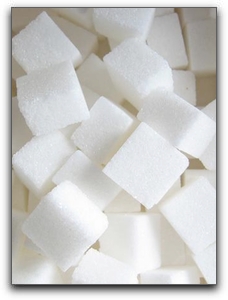
Most of us consume far too much sugar. That isn’t exactly a news flash, but at The Fort Collins Dentist we want to remind you what sugar does to teeth, and what you can do about it.
We get cavities when acids in the mouth attack the enamel and dentin of the teeth. The acid is produced by bacteria in plaque, that sticky film that forms on the surfaces of teeth. When sugar is introduced it interacts with the bacteria in the plaque, and makes the acids, which attack the teeth and cause cavities.
That’s why it is so important to choose food and drink wisely. But it isn’t easy, is it? Sugar seems to be in just about everything. Health experts say the average person in the United States consumes about 19.5 teaspoons of sugar every single day. That is twice as much as is recommended by the American Heart Association!
Knowing how much sugar is in the food that you buy is vital: not just to your teeth, but to your overall health. Reading ingredient labels on processed foods is essential.
Of course, some things are obvious. Eliminate or minimize the sweet stuff, like soda, candy, cookies, cakes, and donuts. Sweet things may seem to make life worthwhile, but there is a high cost.
If you have an incurable sweet tooth, you might try softening the blow by eating more fruit. You’ll still need to brush, of course, but the natural sugars in fruit aren’t as harmful as those in processed foods. If making that change sounds difficult, remember what a wise person once said: we like what we learn to like.
At The Fort Collins Dentist we care about the dental health of each of our patients. So please cut back on sugar, brush your teeth at least twice a day, don’t forget to floss, and see us for a cleaning and checkup every six months. People from Loveland, Timnath, Wellington, and Windsor come to us for dental implants, complete general and family denstiry, and much more. Schedule your next appointment with us today!
Contact The Fort Collins Dentist Family & Implant Dentistry:
970-221-5115
Location (Tap to open in Google Maps):
2001 S Shields St Bldg L
Fort Collins, Colorado
80526











